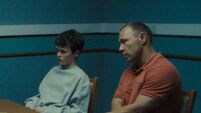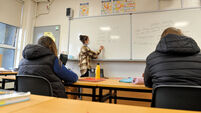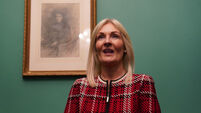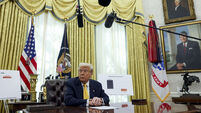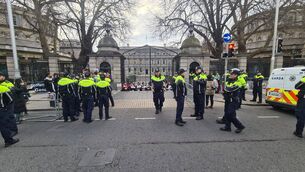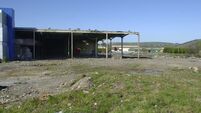Tánaiste Simon Harris: Adolescence and the harm social media can do to our young people

The four-part drama Adolescence has sparked a national debate here in Ireland and made me more determined than ever to address the increasing harm caused by social media.
In an era when streaming services provide endless viewing options it is rare that one TV series attracts as much attention and discussion as the critically-acclaimed Netflix programme .
The four-part drama about a 13-year-old boy accused of the murder of a classmate has sparked a national debate here in Ireland and highlighted the increasingly malign influence of online forces on young people.
As a parent of two young children who are still, I hope, some years from asking me for a smartphone, I found it compelling, harrowing, and deeply moving.
It has made me more determined than ever to address an issue that requires an all-of-government and all-of-society response.
Every generation of parents has had a challenge when it comes to tapping into what their children are talking about with their peers, from the time they are toddlers to when they become teenagers and young adults.
But in the smartphone era, the increasing harm caused by social media to the health and well-being of our young people is a unique and complex challenge.
There is no escaping the stark reality that we are now seeing an alarming trend where young boys are being drawn into online spaces dominated by self-proclaimed 'alpha male' influencers.
They exploit insecurities, and reinforce outdated and dangerous narratives.
The result is that a generation of boys struggle to form healthy relationships.
They are less emotionally resilient and are at risk of internalising damaging ideas about gender and identity.
As Stephen Graham, the co-creator who plays the father of the accused boy in , has explained in recent weeks, everyone is accountable; social media platforms, communities, schools, parents, and, of course, the government.
I have said in recent days that should be compulsory viewing in all our secondary schools, but this is only one relatively small measure.
Last year, as Taoiseach, I convened the Online Safety Summit to ensure a collective focus across government on the implementation of the new Online Safety Code, which sets out how video-sharing platforms must protect adults and especially children from online harm.
The Government, in conjunction with the EU, is taking steps to regulate social media and we are committed to supporting and funding Coimisiún na Meán to enforce the Online Safety Code.
The idea that the online space can be like the wild west is just not acceptable any more.
The era of self-regulation is over and, in this vein, I am committed to examining ways to enforce age-verification obligations on online service providers and hold them to account if they fail to do so.
As well as this, and as my Fine Gael colleague Helen McEntee, the Minister for Education, has already made clear, we need to continue to implement the SPHE and RSE curricula and provide resources and training for teachers to ensure they are effectively delivered.
This will help ensure that teachers can properly communicate with their students and, where necessary, push back on the narrative that unless you’re a certain type of man or girl then you are somehow “not normal”.
We must create an environment at home, in school, in communities and in society for boys and young men to learn that true strength is found in kindness, respect, and emotional intelligence, not in the toxic and despicable bravado they may encounter online.
Digital literacy education also needs to be part of the school curriculum as well as the home environments and, as a government, we will support and fund online safety programmes for schools and give them more flexibility in how to use that funding.
Many schools are already addressing this issue with their own initiatives, including in my hometown of Greystones, Co Wicklow, where all primary schools and parents' associations have agreed a “no smartphone” voluntary code, known as “It Takes A Village”.
This has received international interest and many other schools have adopted it.
There are now clear Department of Education national guidelines in place to support parents and parent associations wishing to develop voluntary codes regarding smartphone use among primary schoolchildren.
We need more schools, more communities, and more parents to come together and say: enough is enough.
I know that many parents and schools are up for this and I want them to know that the government will stand with them.
We will support them in as many ways as it can to protect children and empower young people to be their best selves, where they are free from the pressures of social media and the toxicity that too often comes with it.

